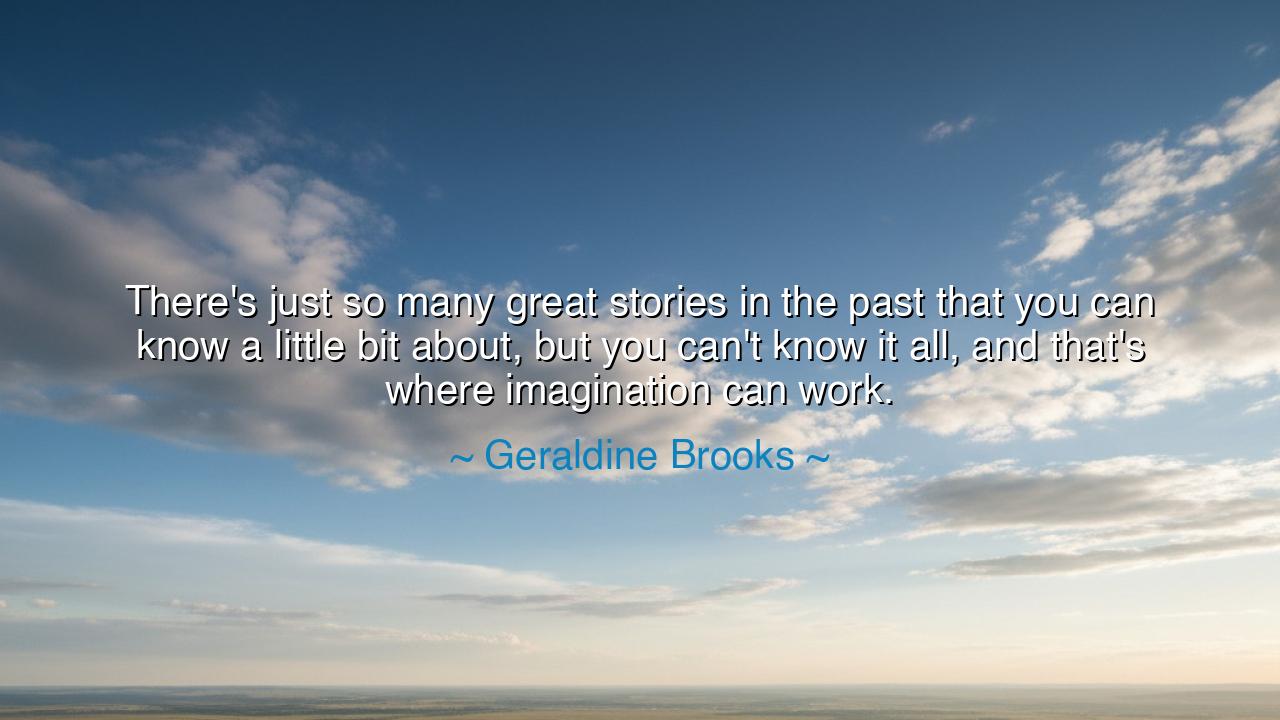
There's just so many great stories in the past that you can know
There's just so many great stories in the past that you can know a little bit about, but you can't know it all, and that's where imagination can work.






O children of the earth, hear now the wisdom of Geraldine Brooks, who speaks of the power of imagination in the pursuit of understanding the vast tapestry of history. She said, "There's just so many great stories in the past that you can know a little bit about, but you can't know it all, and that's where imagination can work." These words echo a profound truth: history, while rich and deep, is never fully knowable. There are fragments, whispers, and remnants of the past, but the full depth of it is veiled in shadows. It is through the gift of imagination that we are able to weave these fragments into something greater, to bring life to the past and understand its true meaning.
History is like a grand river, flowing with the stories of countless souls, but much of its course is hidden from view, buried beneath the earth or lost to time. As Brooks wisely notes, we can know a little, but not all. We may learn of great battles, great empires, and great leaders, but the full complexity of their lives and times slips through our fingers like sand. It is here, in the spaces between the known facts, that imagination steps in. The imagination allows us to fill in the gaps, to create the stories of those who have no voice in the historical record, to breathe life into moments that were never fully understood.
Consider, O children, the great epics of Homer, whose Iliad and Odyssey have become the foundations of Western literature. Homer did not write down every detail of the Trojan War or Odysseus’ long journey home. What he created was an artistic and imaginative reconstruction of the events and emotions of his time. In his mind, the events of the past came alive again, and he weaved them together with the threads of imagination. Through his work, we are able to feel the pain of Achilles, the sorrow of Hector, and the longing of Odysseus. The imagination gave him the power to shape the past and make it relevant to his audience. Homer's imagination was not a replacement for historical truth, but a means of understanding it more deeply.
Similarly, Shakespeare, in his plays, took history and breathed into it a life that was not always true to the facts, but truer to the human condition. In Julius Caesar, Macbeth, and Richard III, Shakespeare used imagination to bring historical events to life, showing us the inner turmoil of men and women who shaped the world. Shakespeare did not claim to tell history as it was but rather as it might have been experienced by those involved. His imagination filled in the silences and revealed the emotional truths that history alone cannot capture.
Brooks speaks of this same creative force, the imagination, as a tool to explore the past. When we study history, we are often faced with incomplete records, lost knowledge, and silences. The true stories of countless individuals, the everyday lives of those who did not make it into the history books, are largely unknown. Yet imagination allows us to give them voice. We can imagine their struggles, their hopes, and their desires. Imagination is not just for fantasy and dreams—it is a powerful force for understanding the human experience, both in the present and in the distant past.
The great novelists, like Brooks herself, are masters of this act of historical imagination. In her novel March, she brings to life the character of Mr. March, the absent father from Louisa May Alcott’s Little Women, filling in the gaps left by Alcott’s limited portrayal. Through her imagination, Brooks is able to give us a fuller picture of the complexities of March’s character and his role in the Civil War. Brooks' imagination does not seek to change history but to bring a fuller, more humane understanding to it, one that speaks to the hearts and minds of readers across generations.
So, O children, the lesson is clear: history is a vast ocean, and we may never know its full depths. Yet, it is in the imagination that we are given the ability to navigate its waters. Through imagination, we can bring the past to life, understand its shadows, and give voice to the forgotten souls who lived in it. Imagination allows us to see beyond the dry facts and uncover the emotional truths that history alone cannot provide. It is through this creative vision that we can connect with the humanity of those who came before us and learn from their lives.
Therefore, O children, use your imagination not just to dream of distant worlds, but to explore the realms of history. Fill in the gaps, bring life to the forgotten, and seek to understand the deep truths hidden within the stories of the past. History, while full of facts, is ultimately the story of the human experience—our joys, our sorrows, our triumphs, and our failures. Through imagination, we can see that these stories are not merely old tales, but living, breathing parts of us all. Embrace your imagination, for it is the key to understanding the past, the present, and the future.






AAdministratorAdministrator
Welcome, honored guests. Please leave a comment, we will respond soon